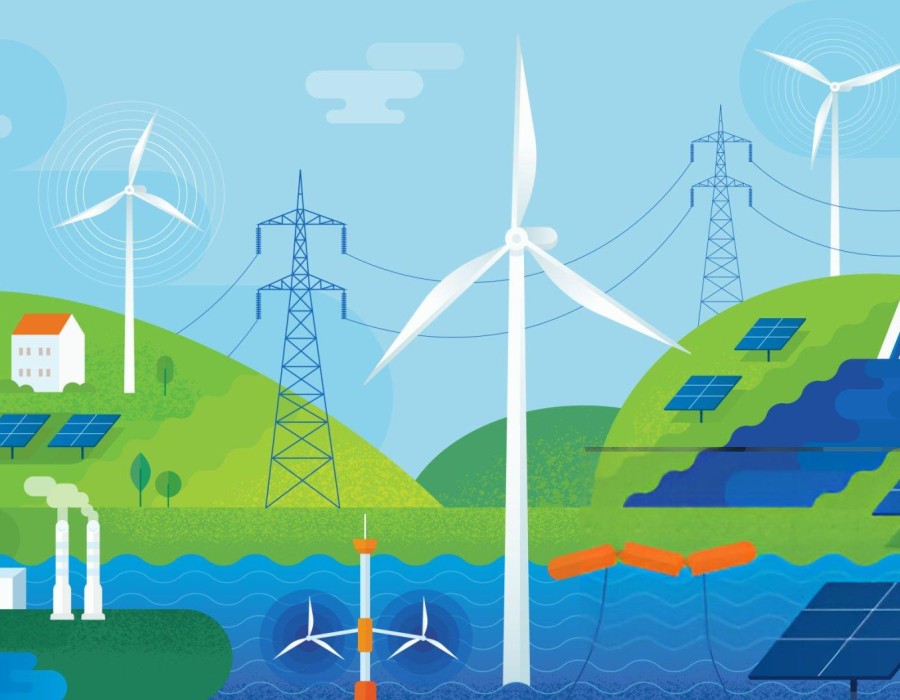The renewable energy sector is rapidly developing, driven by the global push towards sustainable and environmentally friendly power sources. As companies expand and operations become more intricate, efficient management systems are paramount. Renewable Energy ERP Solutions offer comprehensive tools designed to streamline operations, enhance productivity, and support the unique demands of the renewable energy industry. This article explores what ERP solutions entail, the specific needs of renewable energy companies, the benefits of implementing ERP systems, key features to consider, and best practices for successful adoption.
What are ERP Solutions?
Enterprise Resource Planning (ERP) solutions are integrated software platforms that manage and automate a company’s core business processes. These systems unify functions such as finance, human resources, supply chain management, and customer relationship management into a single, cohesive framework. By centralizing data and processes, ERP solutions provide a holistic view of an organization’s operations, facilitating better decision-making and improving overall efficiency.
Core functionalities of ERP solutions include:
· Financial Management: Automates accounting, budgeting, and financial reporting, ensuring accurate and timely financial information.
· Human Resources Management: Manages employee data, payroll, recruitment, and performance evaluations.
· Supply Chain Management: Oversees procurement, inventory, logistics, and vendor relationships to optimize the supply chain.
· Customer Relationship Management (CRM): Enhances customer interactions, sales tracking, and service management.
· Project Management: Facilitates planning, execution, and monitoring of projects, ensuring they are fulfilled on time and within budget.
· Data Analytics and Reporting: Provides real-time insights and comprehensive reports to support strategic planning and operational improvements.
Specific Needs of Renewable Energy Companies
Renewable energy companies operate in a dynamic and highly regulated environment, facing unique challenges requiring specialized management tools. Some of these specific needs include:
· Project Complexity: Renewable energy projects, such as wind farms and solar installations, involve multiple phases, extensive planning, and coordination among various stakeholders.
· Regulatory Compliance: Companies must adhere to strict environmental regulations, safety standards, and reporting requirements, necessitating robust compliance management.
· Asset Management: Managing physical assets like turbines, solar panels, and infrastructure requires efficient tracking, maintenance scheduling, and lifecycle management.
· Supply Chain Coordination: Ensuring timely procurement of materials, managing vendor relationships, and optimizing logistics are critical for project success.
· Financial Management: Renewable energy projects often involve significant investments and complex financing structures, requiring precise financial planning and tracking.
· Sustainability Reporting: Companies must monitor and report on sustainability metrics, such as carbon emissions reductions and energy savings, to meet stakeholder expectations and regulatory demands.
Benefits of ERP for Renewable Energy
Implementing ERP solutions in renewable energy companies offers numerous benefits that contribute to improved management and operational efficiency:
· Enhanced Visibility and Control: ERP systems provide a centralized platform for monitoring all aspects of operations, enabling better oversight and control over projects, finances, and resources.
· Cost Savings: Efficient management of resources, inventory, and supply chains leads to significant cost reductions, enhancing the overall profitability of projects.
· Scalability: ERP systems can scale with the company's growth, accommodating increasing project sizes, expanding teams, and evolving business needs without compromising performance.
· Regulatory Compliance: Automated compliance management ensures that all regulatory requirements are met, reducing the risk of fines and enhancing the company’s reputation.
· Enhanced Collaboration: Integrated communication tools facilitate better collaboration among teams, departments, and external partners, ensuring everyone is aligned and working towards common goals.
Conclusion
Renewable Energy ERP Solutions are instrumental in streamlining operations, enhancing management efficiency, and supporting the unique demands of the renewable energy sector. ERP systems empower companies to optimize their operations, reduce costs, and drive sustainable growth by providing integrated tools for financial management, project planning, asset tracking, and compliance. Selecting the right ERP solution, focusing on key features such as integration and scalability, and adhering to best practices for implementation are essential steps in harnessing the maximum potential of ERP systems. As the renewable energy industry expands, embracing advanced ERP solutions will be pivotal in achieving operational excellence and advancing the global transition towards sustainable energy.





Comments